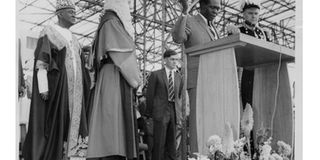Why Obote danced on October 9 and President Museveni doesn’t

Obote takes oath as Uganda's Prime Minister on October 09, 1962. PHOTO/FILE/NMG
What you need to know:
- Today, there are no balls. President Yoweri Museveni disdains dancing. And, without doubt, he would look strange in black tie.
Last Friday, Uganda celebrated its 58th Independence Anniversary. In the evening of October 9, 1962 there was a party and dance at State House to celebrate.
Those days, parties, especially balls, where the men turned up in black tie, and the women in white gloves, were a big deal. Obote used to carry his tuxedoes and bow ties well, and the elegant bearing of a youthful Miria Obote remains unsurpassed by any subsequent First Lady, so they made for quite a ballroom couple.
Today, there are no balls. President Yoweri Museveni disdains dancing. And, without doubt, he would look strange in black tie.
The politics of the ball played out in wider society. Today, a nightclub in Uganda, is a place where people go to get dance, get drunk, eat roast meat, and maybe meet a nice young lonely man or woman. In the past, clubs were cultural-political venues.
Susana Nightclub in Nakulabye was a perfect example. If you read old Drum magazines, it was at the centre of political conspiracies and culture in a big way.
American journalist David Lamb in his abrasive, but wonderfully readable, book The Africans, talks about it being a hotspot for getting diplomatic scoops. He writes, at one point, about Foreign minister Sam Odaka (perhaps one of the most likeable people in Ugandan political history), being a regular.
He would give you a nod, head to the bathroom, and you follow. As you stood there peeing, he would whisper diplomatic leaks in your ear. Now on that evening of October 9, 1962, at State House, there are many telling photos of the party.
Buganda’s King Freddie Muteesa, who was Head of State, is standing around in his officer’s ceremonial uniform, chewing the cud. Everyone is milling about. There is a certain egalitarian air.
To understand why there are no State balls anymore, that egalitarian element is important. You don’t have a high table in a ball. However, given the status Museveni occupies today, he would have to sit at a high table. But also, imagine this: A newly appointed minister of State in an ill-fitting suit, shuffling over and asking First Lady Janet Museveni to waltz.
Janet herself might humour the bloke, but the political environment has changed too much. Museveni is an emperor-president, and Janet an empress, of sorts.
The collegiality of politics is broken. There is no minister or UPDF general, who hangs out drinking tea and playing matatu with Museveni. But even in his disastrous second run in power, Milton Obote’s closest buddies were his ministers and generals.
During Obote II, foreign exchange was scarce and controlled by the Minister of Finance, who also happened to be President Obote. You got the money from the bank with an approval signed by him.
A relative was travelling to far away lands. He filled the form, gathered courage, and intending to be first in queue, headed to the President’s Office. Obote didn’t work in State House, he did his thing in the President’s Office.
A guard told him to take the lift. The lift opened on Obote’s floor, and another guard told him to go and sit in the secretary’s office, which was empty. He was indeed first in queue. After a few minutes, a distant door opened, and he could hear loud laughter.
Immediately after, the door into the secretary’s office opened. It was Obote! His tie and shoes were off and he was walking in socks, and he had his signature suspenders.
As he tells it rather hyperbolically, Obote had enough whisky on his breath to knock out a herd of elephants. It was known at that time, that Obote would sometimes do all-nighters with people like Luwuliza Kirunda, Chris Rwakasisi, knocking down drinks, talking State matters while still sober, and descending in UPCisms when sozzled.
“Young man, what do you want”, Obote asked.
Still shaken, he said he wanted permission to get foreign exchange.
“Where is your form”, Obote asked.
He handed it to him. Obote walked back in the drunken raucous in the inner sanctum with the form to get a pen, and stamp the form. He returned it to him matter-of-factly a minute or so later. And that was it. He was no fan of Obote, and that encounter didn’t change his mind. But it left him conflicted.
Nevertheless, without that collegiality, and community of excess, you can’t have a dance. We wanted to tell it all here, but we ran out of space. So next week, we shall talk of a very different dance that took place outside on that Independence Day 58 years ago, and also return to Odaka. But, you see, sometimes a dance is not a dance.

Mr Onyango-Obbo is a journalist,
writer and curator of the “Wall of Great Africans” |Twitter@cobbo3
Mr Onyango-Obbo is a journalist,
writer and curator of the “Wall of Great Africans” |Twitter@cobbo3





